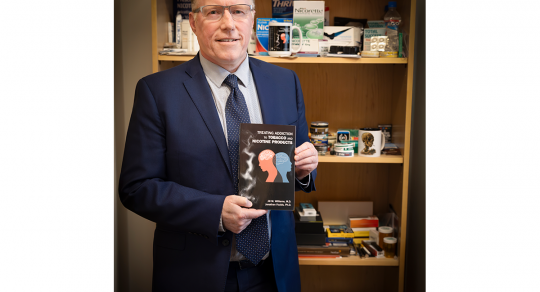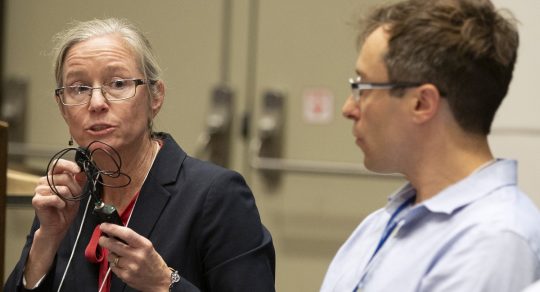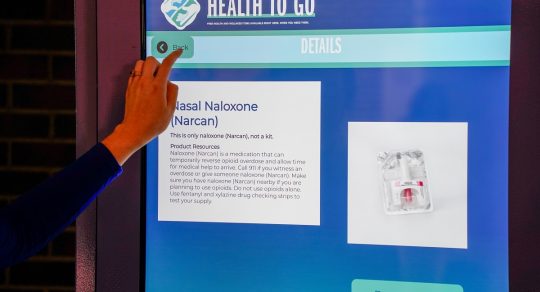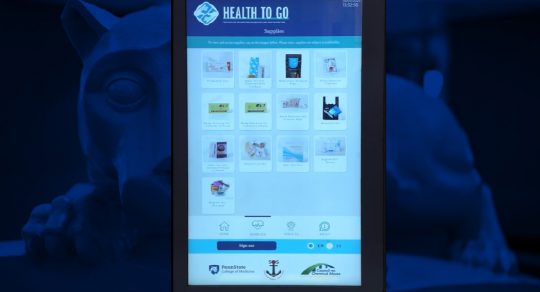Fellowship
Interdisciplinary Addiction Medicine
The Interdisciplinary Addiction Medicine Fellowship at Penn State College of Medicine is a one-year, ACGME-accredited program that admits two fellows per year, with the option of a second year in research.
Explore More
The mission of the Interdisciplinary Addiction Medicine Fellowship is to train the next generation of leaders who can provide the highest quality of medical care for the prevention and treatment of substance-use disorders.
The program also strives to increase the medical work force capable of providing interprofessional, integrated primary care and specialty care for substance-use disorders to medically underserved and vulnerable populations.

Training Elements
The fellowship’s curriculum is based on the three pillars of the learning environment:
Individualized coursework, certificates and degrees, including:
Certificates/masters programs in clinical, translational, qualitative, several statistical/AI, machine learning programs
Mentored interdisciplinary translational research
Tailored seminar series, including:
Grant writing, including K and R level grants
Research design methodologies
Manuscript development
Team and Translational science
Preparing conference presentations
Dissemination of research
Learn More about the Fellowship
Greetings prospective applicants,
We are delighted you are interested to learn more about the Interdisciplinary Addiction Medicine Fellowship at Penn State Health Milton S. Hershey Medical Center. Our goal is to train the next generation of addiction medicine specialists to:
Provide excellent, independent care for people living with addiction
Function as health-systems-aware advocates for improvement in care delivery and public health
Advance the status of addiction science
Teach the broader community the value of compassionate addiction care
Develop skills practicing in interprofessional teams
To realize this goal, we have brought together an outstanding faculty with expertise in addiction medicine, pediatrics, internal medicine, family and community medicine, emergency medicine, pain medicine, obstetrics and gynecology and pharmacology, practicing in a variety of inpatient and outpatient settings. Not only will you have the opportunity to work with and learn from a dynamic group of clinicians and scholars, but you will also benefit from a didactic curriculum that provides a foundation in the biology of substance-use disorders, the medical and psychosocial complications of these disorders, their treatment, research methodology, clinical ethics and clinician wellness.
We recognize that most substance-use disorder care is provided in the community, not the university setting, so you will also train and learn at community sites that offer a wide range of outpatient and residential medical and behavioral care. Your work in the fellowship will equip you to care and advocate for children, adolescents and adults living with substance-use disorders across urban, suburban and rural settings.
By applying to a fellowship in addiction medicine, you are acknowledging your desire to care for an often-marginalized population deserving of high-quality, ethical and compassionate care. Beyond that, you are acknowledging your own humanity, kindness and adaptability, the essential qualities of an addiction medicine provider.
We look forward to meeting you.
Sheryl A. Ryan, MD
Program Director
Bhavna Bali, MD
Associate Program Director
General Application Information
All applications must be submitted through ERAS.
ERAS opens for applications in July and the application review process begins mid-July, so applicants are encouraged to apply early.
The Addiction Medicine Fellowship participates in the National Residency Matching Program (NRMP) Medicine and Pediatric Subspecialties Match, with typically two-four fellowship spots per year. All applicants must have completed a residency from an ACGME-certified training program.
COVID-19 Update for the 2023 Interview Season
In accordance with national recommendations and in fairness to all fellowship candidates, many of whom are under travel restrictions, in-person visits and interviews will be suspended for the 2023 interview season. All fellowship interviews will be conducted virtually via conferencing software. Fellowship candidates are encouraged to pay close attention to ERAS and NRMP calendars for this season, which may be different than prior years, and adhere to all deadlines to ensure a successful match.
Eligibility
Qualified candidates will be:
U.S. citizens, permanent residents or J-1 visa holders (no additional visa types are sponsored)
Board-eligible or board-certified in family and community medicine, emergency medicine, internal medicine, obstetrics and gynecology or pediatrics
Eligible for a Pennsylvania medical training license
Required Supporting Documents
The following documents should be uploaded to ERAS for review:
ERAS application, including current photograph
Personal statement
Curriculum vitae
USMLE or COMLEX transcript
ECFMG certificate (if applicable)
Four letters of recommendation, including one from current program director
International Students
International medical graduates must hold a currently valid certificate from the Educational Commission for Foreign Medical Graduates (ECFMG) to be considered for the match. The program accepts J-1 visas only.
Interview Process
Applications will be reviewed once the ERAS application is complete. Qualified applicants will be invited for an interview. All applications are considered without regard to race, religion, gender or national origin.
Leadership


Program Coordinator, Pediatric Fellowships, Pediatrics

Program Coordinator, Pediatric Fellowships, Pediatrics
Supporting Your Training
Curriculum Details
Clinical rotations will include inpatient experiences at:
Penn State Health Milton S. Hershey Medical Center addiction and pain management
Consult-liaison services and residential programs at the Caron Institute and Gaudenzia in Harrisburg
Outpatient rotations and a continuity clinic including:
Electives will be available depending upon each fellow's interest and are designed to provide clinical experience in the areas of:
Emergency medicine
Obstetrics and gynecology
Pain medicine
Pediatrics
A rigorous core didactic curriculum is part of the weekly schedule. In addition, a one-month elective in research is available to all fellows.
Pennsylvania Psychiatric Institute
Pennsylvania Psychiatric Institute - Opioid Treatment Clinic - 36 weeks (120 hours)
Continuity Clinic - 48 weeks (208 hours)
Lebanon VA Medical Center
Mental Health Residential Rehabilitation Treatment Program - 12 weeks (288 hours)
Mazzitti and Sullivan
Adult IOP Program – Adolescent IOP/PHP Program – 4 weeks (32 hours)
Caron Treatment Center
Adolescent Residential - 4 weeks (64 hours)
Adult Residential - 4 weeks (64 hours)
Gaudenzia Concept 90
Adult Residential - 4 weeks (80 hours)
Adult & Teen Challenge Pennsylvania – 8 weeks (96 hours)
Sadler – 12 weeks (96 hours)
Blue Prints – 4 weeks (64 hours)
Penn State Health Milton S. Hershey Medical Center
Consult-liaison service (required) - 16 weeks (256 hours)
Inpatient pain service (required) - 16 weeks (128 hours)
Women's health service (elective) - 18 weeks (80 hours)
Adolescent medicine clinic (elective) - 16 weeks (48 hours)
Outpatient pain service (elective) - 18 weeks (80 hours)
Emergency medicine (elective) - 16 weeks (160 hours)
Scholarly activity - 4 weeks (128 hours)
Core lecture series - 48 weeks (192 hours)
OBAT (Internal Medicine Primary Care Clinic) – 4 weeks (48 hours)
Vacation/continuing medical education - four weeks (must total at least 160 hours)
Contact Information
Mailing Address
Penn State Health Children's Hospital
Interdisciplinary Addiction Medicine Fellowship
Attn: Heather Matthews-McCormick
500 University Dr., P.O Box 850
Mailcode H085
Hershey, PA 17033
General Contact Information
Phone: 717-531-5458
Email: hmccormick@pennstatehealth.psu.edu




